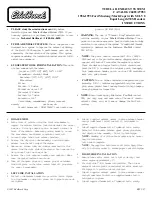
Starting and Operating Instructions
. . . 296
• When towing a trailer with
an automatic transmission,
operate your vehicle in
D
(Drive).
You may want to shift into a
lower gear if the transmission
shifts too often.
• Reduce speed and shift to a
lower gear before starting
down a long or steep down-
grade. If you do not shift to a
lower gear, the brakes could
overheat and you could have
an accident.
• You should not park vehicles
with trailers on a grade (hill).
However, if you must park on a
grade, have someone place
wheel chocks under the trailer
wheels.
For more information, see
"Parking On Hills" later in this
section.
• Your vehicle may show signs of
overheating if you turn your
engine off immediately after
towing at high altitudes on
steep uphill grades.
If possible, park on a level
surface. Set the parking brake
firmly. Shift the automatic
transmission into
P
(Park).
Allow the engine to idle for a
few minutes before turning the
engine off.
If you do get an overheat
warning, see "Engine
Overheating" in Section 5 for
instructions.
CAUTION
Trailer brakes of adequate size
are required on trailers of more
than 900 kilograms loaded
weight.
CAUTION
If you are using a weight-carry-
ing or weight-distributing
hitch, the trailer tongue weight
should be 10 to 15 percent of
the total loaded trailer weight.
Do not exceed the maximum
allowable tongue weight for
your vehicle.
To reduce the effect of trailer
tongue weight on your vehicle’s
rear axle, choose the shortest hitch
extension that will position the
hitch ball closest to the vehicle.
$10araEscalade.fm Page 296 Wednesday, October 14, 2009 9:52 AM
















































